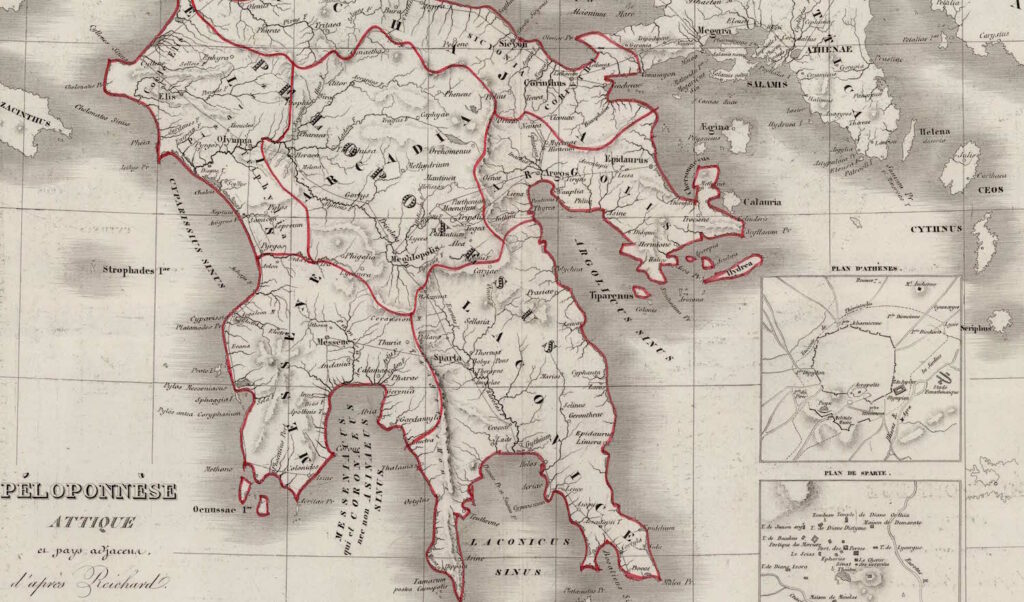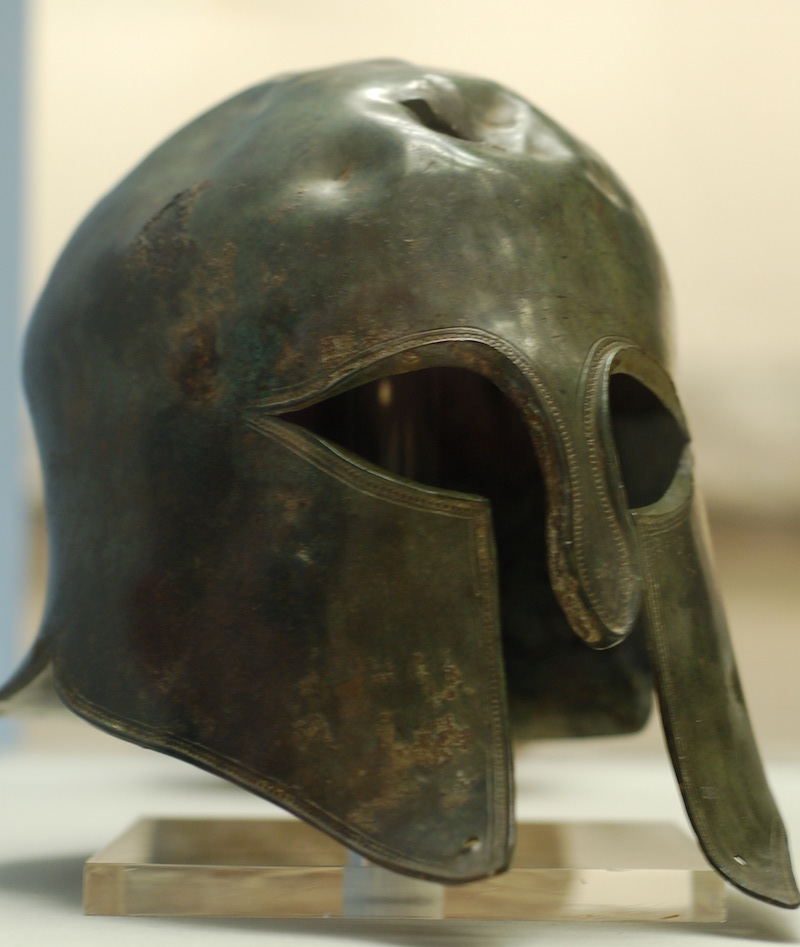Around 399 B.C., the Spartan government discovered a conspiracy to overthrow the state and – according to one source – eat the ruling class. The plot is very colorful, and can easily be dropped into any setting with an unjust government.

First, some background. Sparta, a warrior city-state in ancient Greece, had a deeply bizarre social and political system. The folks most people think of when you say ‘Spartans’ were a tiny minority of the population. These men and women, called Spartiates, were a warrior aristocracy. Boys were trained almost from birth to be soldiers. Clear into middle age, male Spartiates’ lives were structured almost entirely around warfare. As a consequence, Spartan heavy infantry was unmatched anywhere in the ancient world. (Female Spartiates lived a privileged existence, with a level of freedom, education, and athleticism not found anywhere else in Greece)
But it takes more than warriors to make a society. What about the farmers, craftsmen, merchants, and all the other people who do actual productive work? This points us to the ugly side of Spartan society. Spartiates were forbidden from engaging in economic activity. Instead, Sparta’s manufacturing and trading was left to the eighty communities of perioikoi (‘those who live around’). The perioikoi lived in halfway-autonomous towns in the Spartan countryside. They could govern themselves, but they had no say in how the Spartan state was run. They were frequently drafted to fight in wars they had no say over and had no stake in. From a Greek perspective, their lives weren’t too bad. As people who were free (not enslaved), but not enfranchised (had no say in their government), their lot wasn’t much different from the common folk in other Greek city-states run by oligarchies.
But the majority of Spartans were helots (heilotai, ‘captives’). Their lives combined the worst aspects of being a medieval serf and being a pre-Civil War American slave. They were farmers. They did not own their land, had no right to the food they grew, and could be killed without consequence. Every year, the Spartiates legally declared war on the helots, so anyone could kill them without it counting as murder. Young Spartiates were encouraged to steal from and kill helots. The process taught the young Spartiates stealth and inured them to violence. The helots were constantly revolting, and the Spartiates were constantly massacring helots to keep them cowed. Indeed, it can be argued that the relationship between Spartiates and helots explains the bizarre nature of Spartan society. The Spartiate focus on warfare forced them to keep the helots in bondage so the Spartiates still had food, but keeping the helots in bondage required a constant Spartiate focus on warfare. In this perspective, Sparta’s infrequent wars against her neighbors were almost an afterthought, compared to her constant wars against her own farmers.
(A quick note: there were other classes of Spartans too. The hypomeiones (‘inferiors’) were a little-understood class of sub-Spartiates, possibly demoted from full Spartiate status because of cowardice or a failure to pay a special tax. The trophimoi xenoi were the sons of pro-Spartan foreigners, who were sent to Sparta as children to be raised as Spartiates. It was kind of like wealthy Chinese students sent to attend private boarding schools in America, except with way more murder. And the neodamodeis (‘newly one of the people’) were helots who were freed as a reward for exemplary service to the Spartan state.)

So, the cannibal conspiracy! Around 399 B.C., a Spartan seer reported omens showing the Spartan state was surrounded by enemies. Shortly thereafter, an unidentified source reported to the Spartiate authorities that a man named Kinadon was plotting a revolt.
(We don’t know much about Kinadon. He was probably one of the hypomeiones (‘inferiors’), but he was definitely a trusted Spartan agent in the state’s war against the helots.)
The informant claimed everyone was in on the plot – helots, neodamodeis (‘newly one of the people’), perioikoi (‘those who live around’), even the hypomeiones (‘inferiors’). “For whenever they conversed with such men about Spartiates, they said that not even one of the men in those groups could hide how bitterly he felt towards the Spartans, going so far as to say they would even eat them raw.” (Xenophon’s Hellenikia 3.3.6, John Marincola translation)
Now, this is a good place to talk about hyperbole. The ancient historian Xenophon is our main source about this plot. He was notoriously pro-Spartan, and would not hesitate to exaggerate to strengthen his point. The perioikoi rarely revolted against the Spartiates, and the neodamodeis almost never. So at the very least the idea that folks from these two groups wanted to eat the Spartiates raw is probably exaggeration, or even invention. But for the helots? It seems at least plausible to me that the helots’ hatred for the Spartiates ran so deep that they would happily dine on Spartiate flesh. It’s probably still hyperbole, but I’m not willing to rule out the possibility that Xenophon was being deathly serious.
So the Spartiate authorities resolved to arrest Kinadon. He was a trusted counter-helot agent, so they gave him a coded message containing the names of several helots and told him to ride out to arrest them. The mission, they told him, was so important they’d even assigned him a half-dozen bodyguards. Little did Kinadon know, the bodyguards had secret instructions. Once Kinadon was outside the city (so as not to tip anybody off), his bodyguards arrested him.
Under torture, Kinadon gave up the names of his allies. He confessed that he organized the revolt because he didn’t want to be inferior to his former peers, the Spartiates. Whether this is true or not is an interesting question. Xenophon could have inserted this detail to make Kinadon’s aims seem ignoble. Or Kinadon could have just ‘admitted’ whatever he thought his torturers wanted to hear, so as to end his torture sooner.
For crimes against the state, Kinadon and his co-conspirators were publicly whipped, then executed.

Kinadon’s conspiracy works in any setting with an unjust government. The government doesn’t have to be the focus of the setting (though it can be – see the current Kickstarter for Gears of Defiance). It also works if an unjust system of government is just a feature of the setting, like in the ever-popular Game of Thrones.
Kinadon’s conspiracy is clearly nasty, and probably nastier than most PCs will be comfortable with. Cannibalism, you’ll note, is a prominent feature of remarkably few RPGs. Nonetheless, what do the PCs do if they stumble upon the conspiracy? Do they let it ride because its aims are just? Do they report it to the authorities, likely condemning the conspirators to death? If the PCs choose not to engage with the conspiracy, you can resurrect the scheme as a plot hook later. The PCs may learn of the Spartiates’ plan, giving them the opportunity to ambush the arresting party and rescue Kinadon.
Separately, if the PCs are the ones in power, the Spartiates’ scheme to arrest Kinadon is a clever one. It’s absolutely something the party might try.






